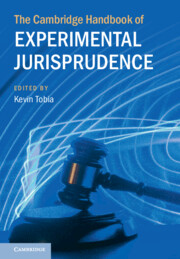
-
Select format
-
- Publisher:
- Cambridge University Press
- Publication date:
- May 2025
- June 2025
- ISBN:
- 9781009170901
- 9781009170918
- Dimensions:
- (254 x 178 mm)
- Weight & Pages:
- 1.6kg, 756 Pages
- Dimensions:
- Weight & Pages:
- Series:
- Cambridge Law Handbooks
- Subjects:
- Law: General Interest, Law, Psychology, Cognition, Jurisprudence
- Collection:
- Cambridge Law Handbooks
You may already have access via personal or institutional login- Series:
- Cambridge Law Handbooks
- Subjects:
- Law: General Interest, Law, Psychology, Cognition, Jurisprudence
- Collection:
- Cambridge Law Handbooks
Book description
This handbook introduces readers to the emerging field of experimental jurisprudence, which applies new empirical methods to address fundamental philosophical questions in legal theory. The book features contributions from a global group of leading professors of law, philosophy, and psychology, covering a diverse range of topics such as criminal law, legal interpretation, torts, property, procedure, evidence, health, disability, and international law. Across thirty-eight chapters, the handbook utilizes a variety of methods, including traditional philosophical analysis, psychology survey studies and experiments, eye-tracking methods, neuroscience, behavioural methods, linguistic analysis, and natural language processing. The book also addresses cutting-edge issues such as legal expertise, gender and race in the law, and the impact of AI on legal practice. In addition to examining United States law, the work also takes a comparative approach that spans multiple legal systems, discussing the implications of experimental jurisprudence in Australia, Germany, Mexico, and the United Kingdom.
Contents
Metrics
Altmetric attention score
Full text views
Full text views help Loading metrics...
Loading metrics...
* Views captured on Cambridge Core between #date#. This data will be updated every 24 hours.
Usage data cannot currently be displayed.
Accessibility standard: Unknown
Why this information is here
This section outlines the accessibility features of this content - including support for screen readers, full keyboard navigation and high-contrast display options. This may not be relevant for you.
Accessibility Information
Accessibility compliance for the PDF of this book is currently unknown and may be updated in the future.

